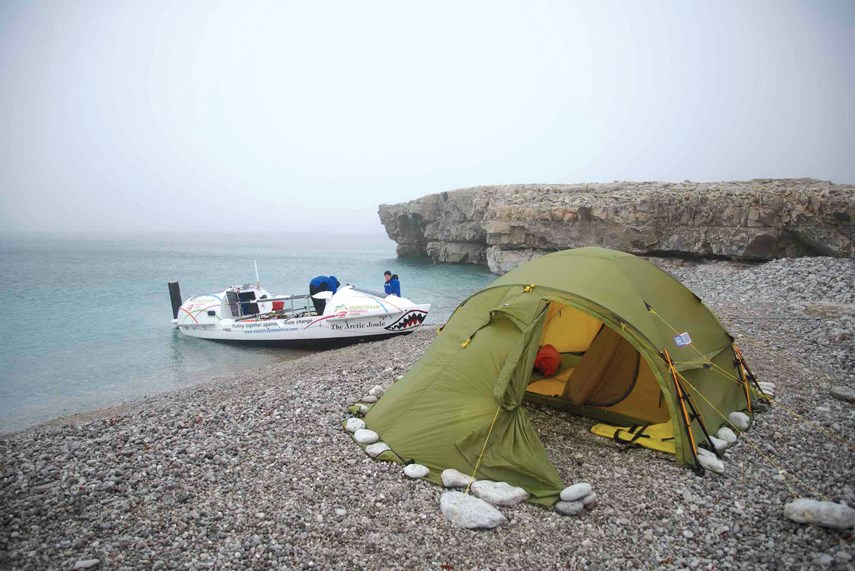Kevin Vallely presents Rowing the Northwest Passage, Tuesday, Oct. 24, 7 p.m., Joe Fortes Branch of Vancouver Public Library. For more information visit vpl.bibliocommons.com.
First, it was impossible. Then, it was only preposterous.
That was good enough for Kevin Vallely to attempt his longtime goal: rowing the Northwest Passage.
It’s the route “for which so many died seeking gold and glory,” as Stan Rogers once sang. It’s where a frosty crew deposited Henry Hudson in a rowboat and left him to die. It’s the route Jacques Cartier was certain was just past the rapids. It’s why a borough in Montreal is named for China: Lachine, Que., the place, fittingly enough, where Vallely was born.
The Lynn Valley author and adventurer recounts those stories in his new book: Rowing the Northwest Passage: Adventure, Fear, and Awe in a Rising Sea.
He describes a “horde of icy marauders,” while the boat, the Arctic Joule, is “encased in slushy porridge.”
Early in the book, one of Vallely’s companions utters a telling phrase: “We’re caught in a current or something.”
It’s the “or something” that expresses the fear that they’re trapped in something beyond their perception as they attempt something that’s never been done.
Just about every page of the book brims with Vallely’s love of adventure, a trait he may have inherited from his father, or at least his father’s stories.
In the 1960s, when Dr. Strangelove mimicked geopolitics and vice-versa, Kevin Vallely’s father was a radio operator in Northern Labrador, keeping watch for the Soviets to try something sneaky.
In the middle of winter, the radar station burned down.
“My father and the two other operators barely escaped with their lives and had to survive in a storage shed,” Vallely writes.
There was something about those stories “endless darkness” and weather cold enough to freeze human skin “in seconds” that compelled Vallely.
“I’ve seen the Arctic as a romantic landscape for as long as I can remember,” he writes.
The first time he got near a similarly unforgiving landscape followed a discussion with Dave Norona. The two former North Shore News columnists elected to ski the Iditarod trail.
Vallely says he remembers being “completely ill-prepared.” He remembers a bronchial infection and coughing up blood. He also remembers loving it.
For a time, Vallely was an adventurer in the purest sense of the word, chasing adrenaline from one continent to another.
But something occurred to him around the time he skied the South Pole.
Media accounts of Vallely’s journey and his bacon-heavy diet spread through social media platforms, creating a colossal number of “media impressions.”
While it may have been fleeting, as fame usually is, Vallely had the world’s attention.
It was also around that time that he watched Al Gore’s An Inconvenient Truth.
As he researched global climate change, Vallely came to view climate change skeptics as akin Galileo’s doubters.
“It frustrates me to no end,” he says.
The frustration, he explains, is that lobbyists continually muddy the debate in the same fashion tobacco companies once obfuscated when it came to lung cancer. (Smokers of Lucky Strikes were promised no throat irritation. After all, “It’s toasted.”)
“Let’s stop debating whether science is real and let’s get on with debating how we’re going to deal with an existential crisis,” Vallely says.
Vallely’s book is a bid to end that debate.
“What a powerful way to make a statement: to do something that could not have been done before that you can do now because of climate change.”
The statement had its detractors, as Vallely and his companions were dubbed “Eco greenie Kool-Aid chuggers.”
“Dismiss the messenger, you dismiss the message,” Vallely says. “They want to silence us and I’m not going to be silenced.”
Changing minds on climate change is a daunting task, but Vallely’s plan of attack is that of a smuggler.
The book is an adventure yarn. He uses phrases like “hair-raising action,” and when the rowers are in a difficult situation, he describes a challenging plan and adds the phrase: “but it’s our only choice.”
But marbled into the story are descriptions of NASA director James Hansen’s 1988 testimony warning of the warming trend to come. There’s mentions of the Kyoto Protocol, which failed to include a great many countries, and the great empty gesture of the Copenhagen Accord. There’s facts and figures around ice melt and rising temperatures.
But there are also accounts of elders who live in the Arctic. Accounts that, as Vallely points out, have historically been ignored.
In discussion with Vallely, the elders describe melting permafrost and sheets of ice slipping into the ocean.
“They’re the voice of the Arctic,” Vallely says. “It’s these voices we have to hear.”



